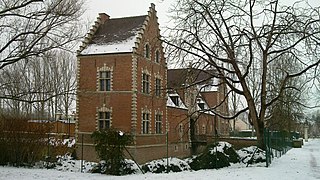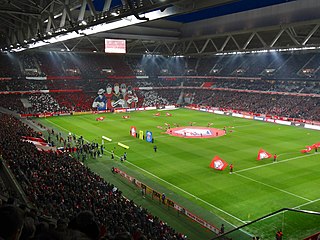
Villeneuve-d'Ascq is a commune in the Nord department in northern France. With more than 60,000 inhabitants and 50,000 students, it is one of the main cities of the Métropole Européenne de Lille and the largest in area (27.46 km2) after Lille. It is also one of the main cities of the Hauts-de-France region.

Lille Olympique Sporting Club, commonly referred to as LOSC, LOSC Lille or simply Lille, is a French professional football club based in Lille, Northern France competing in Ligue 1, the top division of French football. Lille have played their home matches since 2012 at the Stade Pierre-Mauroy. The 50,186-capacity retractable roof venue is the fourth-largest stadium in France.

Stade Henri-Jooris was a sports stadium in Lille, France. The stadium, used mostly for football matches was able to hold 15,000 people and was home stadium of Olympique Lillois and Lille OSC.

Stadium Lille-Métropole is a multi-purpose stadium in Villeneuve-d'Ascq, France. The stadium was built in 1976 and is able to hold 18,154 spectators. The architect of the stadium was Roger Taillibert.

The Stade Pierre-Mauroy, also known as the Decathlon Arena – Stade Pierre-Mauroy for sponsorship reasons, is a multi-use retractable roof stadium in Villeneuve-d'Ascq in Northern France, that opened in August 2012. With a seating capacity of 50,186, it is the fourth-largest sports stadium in France and the home of French professional football club Lille.

Union Sportive Quevillaise-Rouen Métropole, known as US Quevilly-Rouen, US Quevilly, QRM, Quevilly-Rouen, or simply Quevilly, is a football club based in Le Petit-Quevilly in the Métropole Rouen Normandie, France. The club plays in Ligue 2 and hosts its home matches at the Stade Robert Diochon, which has a capacity of 8,372.

Benjamin Michel Édouard André is a French professional footballer who plays as a central and defensive midfielder for Ligue 1 club Lille, for which he serves as the captain.
The 1990 FIFA World Cup qualification UEFA Group 7 was a UEFA qualifying group for the 1990 FIFA World Cup. The group consisted of Belgium, Czechoslovakia, Luxembourg, Portugal and Switzerland.
The 2012–13 season was Lille OSC's 69th season in existence and the club's 13th consecutive season in the top flight of French football.
The 2013–14 season was Lille OSC's seventieth season in existence and the club's fourteenth consecutive season in the top flight of French football. For the first time since the 2008–09 season, the club failed to qualify for any European competition and therefore only participated in domestic competitions.
The 2014–15 Ligue 1 season was the 77th season since its establishment. Paris Saint-Germain were the two-time defending champions and successfully defended their title.
The 2014–15 season was Lille OSC's 71st season in existence and the club's 15th consecutive season in the top flight of French football.
The 2016–17 season was Lille OSC's 73rd season in existence and the club's 17th consecutive season in the top flight of French football.

Martin Albert Frédéric Terrier is a French professional footballer who plays as winger or forward for Bundesliga club Bayer Leverkusen.

Leonardo "Léo" César Jardim is a Brazilian professional footballer who plays as a goalkeeper for Vasco da Gama.

Edon Lulzim Zhegrova is a professional footballer who plays as a right winger for Ligue 1 club Lille. Born in Germany, he plays for the Kosovo national team.

Mehmet Zeki Çelik is a Turkish professional footballer who plays as a right-back or right wing-back for Serie A club Roma and the Turkey national team.
The 2019–20 season was Lille OSC's 76th season in existence and the club's 20th consecutive season in the top flight of French football. In addition to the domestic league, Lille participated in this season's edition of the Coupe de France, the Coupe de la Ligue, and the UEFA Champions League. The season covered the period from 1 July 2019 to 30 June 2020.
The 2020–21 season was the 77th season in the existence of Lille OSC and the club's 21st consecutive season in the top flight of French football. In addition to the domestic league, Lille participated in this season's edition of the Coupe de France and the UEFA Europa League. The season covered the period from 1 July 2020 to 30 June 2021.












